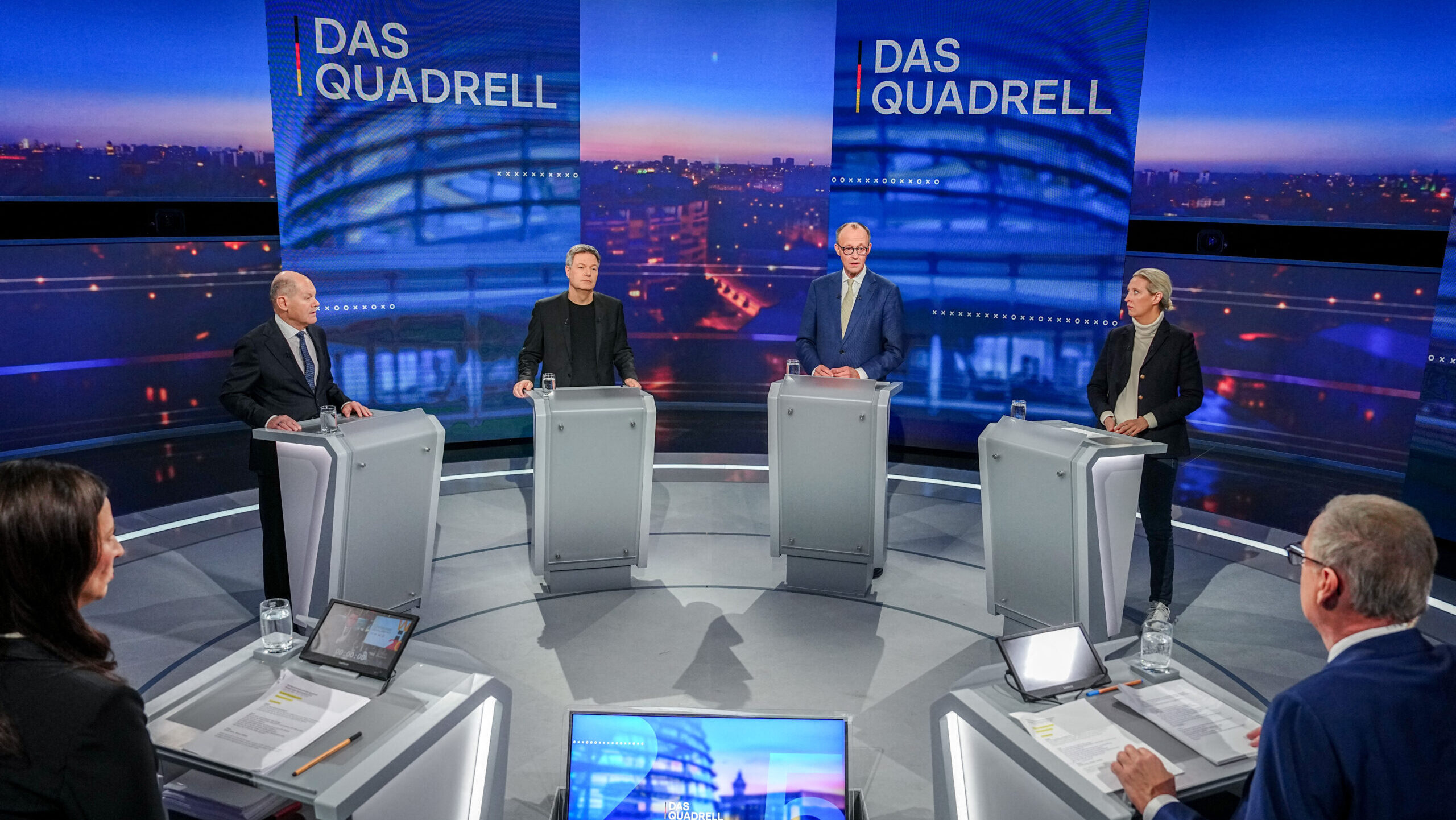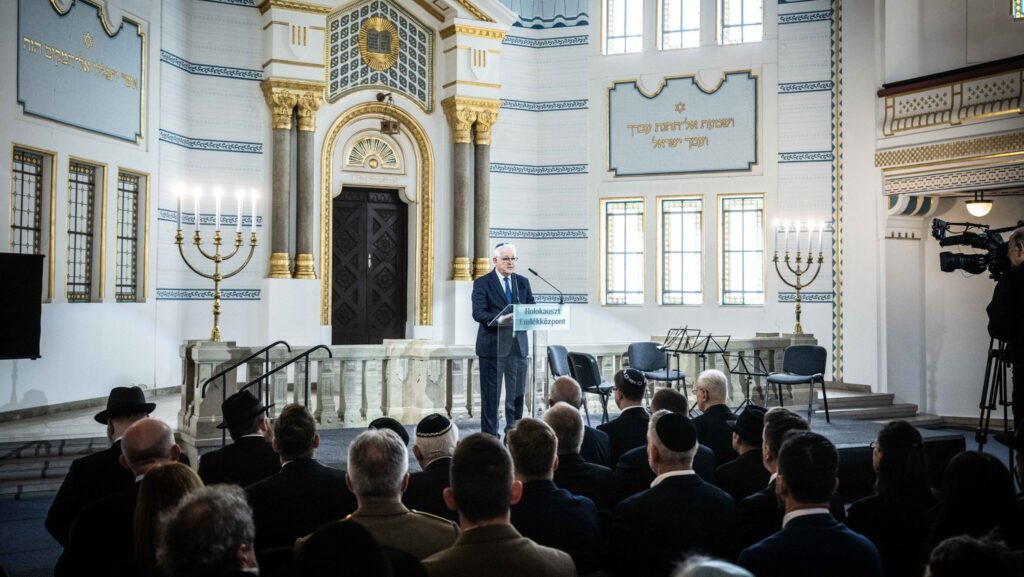With less than a week until the most consequential election in Germany’s post-war history, chancellor candidates from the country’s four largest parties took part in a fiery television debate (Das Quadrell) on Sunday, focusing on migration, the economy, and US–German relations under the second Trump administration.
Even before the debate, it was evident that Alice Weidel, chancellor candidate of the right-wing, anti-immigration Alternative für Deutschland (AfD), was entering the discussion in the most favourable position. AfD, currently the second-largest party in Germany, is polling at around 22–25 per cent, trailing the Christian Democratic Union (CDU), which stands at approximately 28–30 per cent. The party’s long-standing, uncompromising stance against illegal immigration—widely credited for its rise—has also led to its marginalization and a so-called firewall imposed by the mainstream parties.
In the days leading up to the debate, Germany was once again shaken by a terrorist attack. On Thursday an Afghan migrant drove a car into a group of pedestrians—later identified as members of a trade union—in Munich, just one day before the start of the Munich Security Conference, which was attended by top EU and US officials, including Vice President JD Vance. The attack, which left more than 30 people injured, was the latest in a string of violent incidents linked to migrants or immigration-related issues in Germany, underscoring a deep security crisis that mainstream parties have failed to address.
That being said, even the definition of illegal migration sparked debate among the candidates. The mainstream candidates—Robert Habeck of the Greens, Olaf Scholz of the Social Democratic Party (SPD), and Friedrich Merz of the CDU—avoided using the term, instead referring to it as ‘irregular’ migration. Weidel countered this, stating unequivocally that such migration is not ‘irregular; it’s illegal’. She continued: ‘It starts with prevention. We will secure our borders and deport criminals. We have seen an erosion of internal security, and we want to restore law and order in this country.’
In what appeared to be a desperate attempt to defend his government’s handling of migration, Chancellor Scholz highlighted recent deportations of Afghan migrants. However, his efforts were widely seen as unconvincing, especially after JD Vance directly criticised progressive European leaders for their failure to secure the EU’s external borders during his speech at the Munich conference. In a further blow to Scholz, Vance refused to meet with him at the conference—choosing instead to hold talks with Weidel.
‘Vance refused to meet with Scholz at the conference—choosing instead to hold talks with Weidel’
Vance’s speech and broader US–German relations took centre stage in the debate, though this was hardly surprising. On Friday Vance had delivered a scathing critique of the EU, accusing Western European leaders of having become too ‘woke’—curtailing free speech, marginalizing right-wing forces, failing to combat migration, and abandoning what he described as the ‘fundamental shared values’ between Europe and the United States. He also put direct pressure on CDU leader Friedrich Merz to cooperate with AfD after the election in order to prevent the formation of a government that includes the far left.
‘I won’t be told by an American vice president who I can and cannot talk to,’ Merz said firmly during the debate, reiterating his position against forming a coalition with AfD. He continued: ‘I accepted the election result in the USA, and I expect the American government to do the same for ours. I made that clear to Vance. I will not accept foreign interference in our election or in the formation of our government. The Americans have no role in that.’ Scholz echoed Merz’s criticism, accusing Vance of interfering in German politics.
Weidel, however, struck a markedly different tone, welcoming Vance’s remarks and expressing AfD’s openness to fostering strong relations with the US. She also backed Washington’s push for a ceasefire in Ukraine, stating that Trump was ‘the right person’ to bring the war to an end. The AfD leader further emphasized the need for pragmatic diplomacy, saying her party supports good relations with both Western and Eastern powers. ‘We have friends in the West and the East,’ Weidel stated.
In the latter part of the debate, the mainstream parties attempted to continue their long-standing strategy of demonizing AfD, with Scholz drawing comparisons between the party and the Nazis. ‘That comparison is scandalous, and I reject it on behalf of my party,’ Weidel responded. ‘By saying that, you are insulting millions of people who vote for us. We are a conservative, peaceful party.’
AfD has been gaining significant international attention in recent days. The surge began last Wednesday when Hungarian Prime Minister Viktor Orbán received Weidel in Budapest, making him the first sitting prime minister of a foreign country to do so. Just two days later Weidel met with Vance for bilateral talks in Munich. Then came Vance’s speech at the Munich Security Conference, which effectively exposed the efforts of Germany’s political mainstream to isolate AfD—ultimately boosting the party’s prospects for the upcoming election.
In her closing remarks, Weidel invoked a theme reminiscent of Donald Trump’s campaign slogan, pledging to ‘make Germany wealthy and secure again’. She declared:
‘We will stop illegal immigration by securing our borders and deporting those who are here illegally or who commit crimes. The CDU, by the way, has prevented this for years. We have the highest energy prices in the world, which we will also change with the help of new technologies—reliable nuclear power, coal, gas, and also renewable energies, but without the enormous subsidies that harm our country and its taxpayers. Vote for AfD for real political change.’
Related articles:







